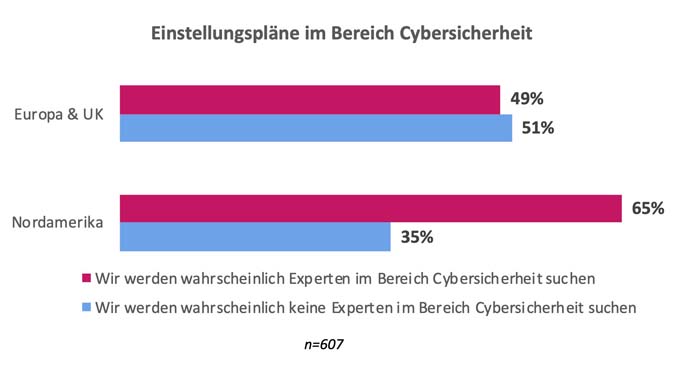Cyber skills shortage threatens corporate security
A survey by Tata Consultancy Services shows: To keep up with cybercriminals, companies do not need more budget, but employees with relevant IT security expertise, i.e. cyber specialists.

It is a well-known fact that the threat of cyber attacks is increasing with increasing digitization. This is why IT security experts are in particularly high demand: According to the Risk & Cybersecurity Study 2022 by IT consulting firm Tata Consultancy Services (TCS), companies see the biggest challenge in the area of cybersecurity not in budget, but in the shortage of cyber specialists. According to the study, half (49 percent) of EU and UK companies plan to hire professionals with cybersecurity skills in the future. In North America, as many as two-thirds (65 percent) intend to look for talent in the future.
For the study, 607 companies from Europe and North America with annual revenues of at least $ 1 billion were surveyed. The interviews were conducted with executives responsible for cybersecurity at their companies. These included chief risk officers (CROs) and chief information security officers (CISOs) from the financial sector, utilities, media and information services, and mechanical and plant engineering.
Cyber skills shortage among top hurdles for enterprise IT security
Chief risk officers (CROs) and chief information security officers (CISOs) report in the survey that they have already had difficulty attracting (44 percent) and retaining (42 percent) talent with cyber risk and security skills in the past year.

The second biggest hurdle cited by the CROs and CISOs was the requirements of the work environment, such as the home office and the associated risks. For example, employees had to be given numerous remote accesses to their employer's systems and databases at short notice due to the pandemic and the resulting move to the home office. This opens up new points of attack for cyber criminals. Assessing the various security risks and quantifying their costs is the third biggest challenge for the respondents.
Cybersecurity is not a budget issue
Only in tenth place in the ranking come any budget restrictions. The fact that the latter are affecting fewer and fewer companies is demonstrated by the high level of willingness to invest: 52 percent of European companies and 62 percent of North American companies stated that they had increased their budgets for IT security since last year.
"Keeping up with the most advanced tactics of cybercriminals is not so much a question of financial resources. Rather, the challenge is finding and retaining the right professionals with the required expertise," says Santha Subramoni, Global Head of Cybersecurity Services at Tata Consultancy Services.
How companies ensure they have a recruiting edge
While one measure alone cannot solve the cyber skills shortage. "However, companies can help close the skills gap by using external service providers for hard-to-fill tasks such as 24/7 network monitoring, while at the same time promoting talent internally," says the TCS security expert. In addition, the study shows that the more frequently the board of directors addresses the issue of cybersecurity, the more successful the company is in finding and retaining relevant experts.
Another finding: The study identifies a link between employee retention and the way a company stores its information. Companies that rely on cloud solutions have a slight advantage in recruiting cyber talent over companies that prefer on-premise solutions or traditional data centers to the cloud. In fact, cloud platforms give companies a five-point advantage in recruiting and retaining cyber experts. "Given the increasing complexity of cybersecurity, the talent gap is also widening," adds Rainer Zahradnik, Country Manager TCS Switzerland. "Sustained executive attention, financial sponsorship and process changes within the company will be critical to recruiting and retaining top talent."
Source and further information: www.tcs.com/risk-cybersecurity









